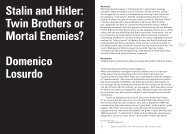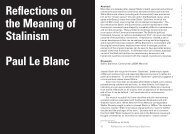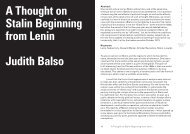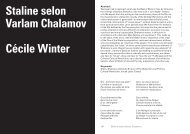adrian
adrian
adrian
- No tags were found...
You also want an ePaper? Increase the reach of your titles
YUMPU automatically turns print PDFs into web optimized ePapers that Google loves.
of Kantian transcendental idealism to the absurdity of treating “true”knowledge as a knowing of admittedly false appearances (i.e., idealphenomenal objects unrelated to and different-in-kind from realnoumenal things—the latter including, on this reading, supposed pureintuitions [als Sinnlichkeit] as passively received hypothetically priorto their transubstantiation into actual objects of experience by theconcepts and categories of the understanding 66 ). Kant’s anti-realistsubjectivism, with its non/pre-speculative, Verstand-style oppositionaldualism between subject (as the transcendental unity of apperception)and object (as das Ding an sich), backs him into this indefensible corner(with the phrase “fremder Anstoß” in the quotation immediately above,Hegel signals that Fichte, as likewise a subjectivist transcendentalidealist, is in the crosshairs here too). But, what qualifies as an alternateversion of the transcendental unity of apperception that manages to beboth realist and yet, at the same time, also idealist in ways that reflectKant’s valuable epistemological insights?This question can be answered with a single proper name:Francis Bacon, the founding figure of British empiricism who, in his 1620New Organon, erects the basic scaffolding of modern scientific method(at the same time that Galileo contributes another key component tothe foundations of scientific modernity, namely, the identification ofmathematics as the language of nature 67 ). Bacon not only provides thelone epigraph for the Critique of Pure Reason 68 —Kant also, in the 1787“Preface to the Second Edition” of the first Critique, explicitly comparesthe Copernican revolution of his critical-transcendental turn at thelevel of first philosophy (as metaphysics qua integrated epistemologyand ontology) with “the suggestion of the ingenious Francis Bacon”at the level of natural science. 69 In particular, Kant credits Bacon witha spontaneous, proto-idealist realization to the effect that the order,pattern, and regularity of the apparently lawful world of nature must beproduced through the practices of minded and like-minded subjects (inBacon’s case, nature reveals its laws only in and through the process ofscientific investigators actively submitting it to empirical, experimentalinterrogation and probing directed in advance by theoretical andCRISIS&CRITIQUE#3methodological guidelines 70 ). In Kant’s prefatory narrative here, the firstCritique’s transcendental idealism raises Baconian empiricism to thedignity of its notion (as Hegel might put it) by insisting that subjectivitymakes possible every knowable and known objectivity, whether in thenatural sciences or any other branch of whatever could count as genuineknowledge per se. 71In the opening pages of the section of the Phenomenology ofSpirit on “Reason,” particularly the start of this section’s first majordivision on “Observing Reason” (Beobachtende Vernunft), Hegelis referring implicitly to this Bacon in addition to (as seen in thequotations I discussed above from the Phenomenology) the Kant ofthe “Transcendental Deduction.” The figure of Observing Reason,which culminates in the self-subverting dead end of phrenology’sinfinite judgment “Spirit is a bone,” 72 represents the Weltanschauungof modern science circa the seventeenth and eighteenth centuries,especially this worldview’s naturalism with its obsessive (and ultimatelyself-destructive qua auto-dialecticizing) pursuit of natural laws. Thevery first paragraph of the sub-section on “Observing Reason” can beunderstood solely through appreciating Bacon’s tacit presence in itsbackground:It is true that we now see this consciousness (Bewußtsein), forwhich Being [Sein] means what is its own [Seinen], revert to thestandpoint of ‘meaning’ (Meinen) and ‘perceiving’ (Wahrnehmen);but not in the sense that it is certain of what is merely an‘other’ (Anderen). Previously, its perception and experience(erfahren) of various aspects of the Thing (Dinge) were somethingthat only happened to consciousness; but here, consciousnessmakes its own observations and experiments. ‘Meaning’ and‘perceiving,’ which previously were superseded for us (für unsfrüher sich aufgehoben), are now superseded by and forconsciousness itself. Reason sets to work to know the truth(die Wahrheit zu wissen), to find in the form of a Notion(Begriff) that which, for ‘meaning’ and ‘perceiving,’ is a Thing;i.e. it seeks to possess in thinghood (Dingheit) the consciousnessonly of itself. Reason now has, therefore, a universal interest inCRISIS&CRITIQUE#366 Kant 1998, B145 (pp. 253-254).67 Galileo 1957, pp. 274-278.70 Bacon 2000, pp. 21, 24, 33-35.68 Kant 1998, Bii (p. 91).71 Kant 1998, Bxii-xiv (pp. 108-109).69 Kant 1998, Bxii (p. 108).72 Hegel 1977c, pp. 208-210.388 “Where to Start?: Robert Pippin, Slavoj Žižek...389“Where to Start?: Robert Pippin, Slavoj Žižek...






